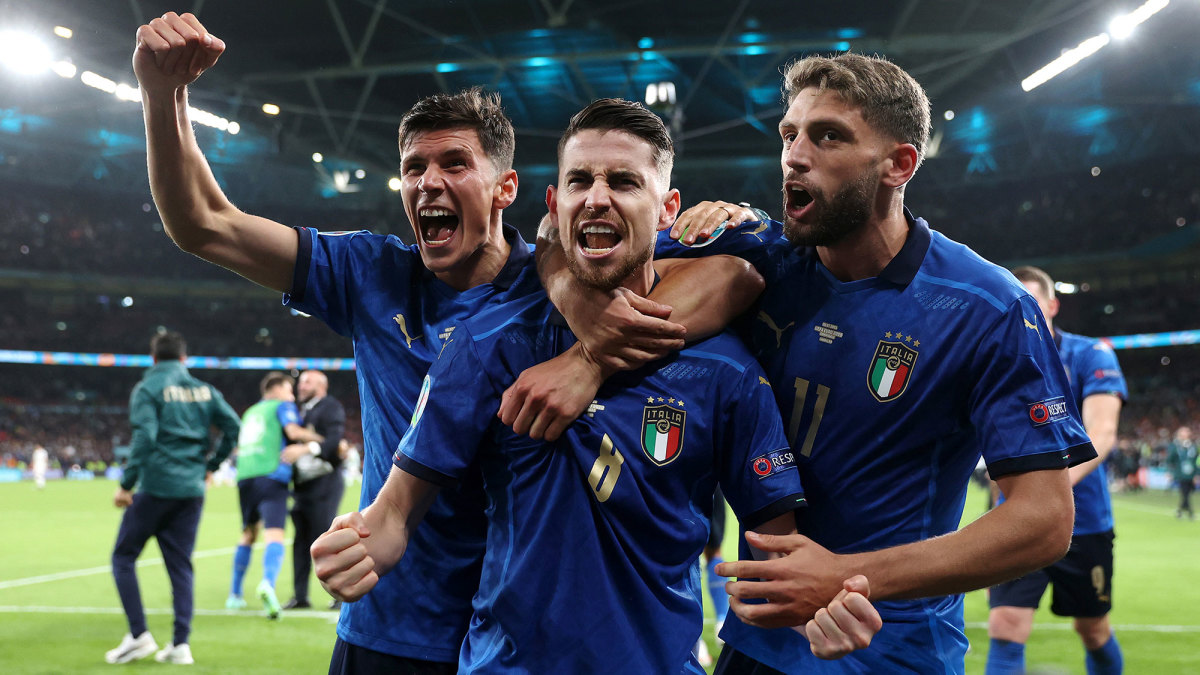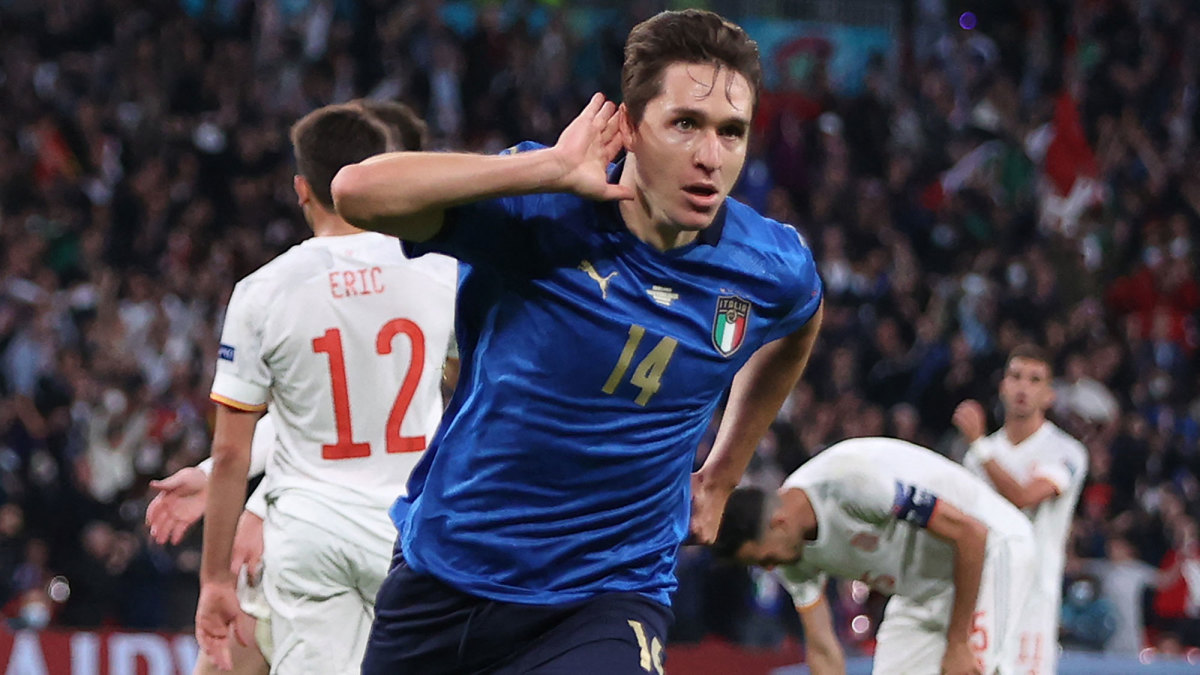Evolved Italy, Spain Add a Classic to Their Rivalry as Azzurri Reach Euro 2020 Final

The sadness was the sense of inevitability. Alvaro Morata had come off the bench to score the goal that got Spain back into the game, but he is a player who never looks comfortable when he has time to think. He had missed a penalty in open play against Slovakia, and he missed the vital kick in the shootout as Italy got by Spain in the latest of their encounters on a major stage to reach the final of Euro 2020 after their 1–1 draw at Wembley Stadium on Tuesday.
Morata has had a strange tournament, a mixture of awful misses and moments of brilliance. His family has been abused, and yet he has scored vital goals. And yet somehow he always seemed likely to be the fall guy at the end of a truly remarkable game. It was quick, open, end-to-end, a battle of two sides both intent on playing passing football but with an element of directness. This was neither the sterile possession of which Spain has been accused in the past, nor the old-fashioned grappling of Italy. Rather it was a festival of modern, progressive football, almost certainly the best game of the tournament, and quite possibly the best game played at the new Wembley. It was capped by a classic Jorginho penalty kick, the assured Chelsea midfielder sending his side to the final against either England or Denmark in London with a trademark hop and smooth, calm finish.
There is a sense in which Spain and Italy represent opposite poles of one of football’s many intersecting spectrums. Spain’s nickname may be La Furia Roja—the Red Fury—a description bestowed for its ferocious performance in beating the Netherlands to claim silver at the 1920 Olympics in Antwerp. To at least to one Dutch journalist, it recalled the Sack of Antwerp by Spanish troops during the Eighty Years War in 1576, but more recently, even before the Pep Guardiola revolution at Barcelona, it has tended to prioritize a more artistic form of the game.
For Spain, for a long time, Italy represented the other extreme. It was cynical and successful, winning four World Cups before Spain won its first. Spanish players almost never did well in Serie A. Luis Enrique felt the sharp end of that, having his nose broken by Mauro Tassotti’s elbow as Italy beat Spain at the 1994 World Cup. The incident was missed by the referee, but Tassotti subsequently received an eight-game ban and never played international football again.

That was the eighth major tournament—and the fourth straight Euros—the sides had met (the first, at the 1934 World Cup, required a replay after their initial match had finished 1-1). Spain hadn’t gotten by Italy in any of them until they met in Vienna in the quarterfinals of Euro 2008. That was the best Spain side in living memory, despite—or because of?—the retirement of Raúl. Spain had won every group game, scoring eight times as it did so. It has proved it had the technique, but did it have the mentality? The game finished 0–0, and Spain won on penalties.
That was the only game Spain failed to win outright at that tournament, but it was perhaps the most significant. The Italian curse was lifted. At Euro 2012, the sides drew in the group stage before Spain romped to a 4–0 win in the final, a performance so good that Italy manager Cesare Prandelli, who had tried to impose a more Spanish approach, could say only that Italy had to learn from it. Guardiola’s vision of press-and-possess, and variants thereof, had come to dominate.
By Euro 2016, Italy, managed by Antonio Conte, was playing with a high press, turning away from the traditional Italian style, and beat Spain 2–0. That was Spain in its decadent phase, struggling to adjust after its run of three straight tournament wins had come to an end. As Italy mysteriously retreated under Gian Piero Ventura, Spain recorded a win and a draw in the two qualifiers for the 2018 World Cup, but with reforming coaches in charge of both, Tuesday's classic felt like a more realistic statement of where the two sides are at.
Mancini has his side press; Luis Enrique is trying to adapt the Spanish possession model to something more direct. There is a sense of both managers moving away from what had come to be seen as their respective nations’ distinctive styles. And yet, in the first half, there was a reversion to type. Spain passed, Italy broke. Spain had the bulk of possession and chances, but Italy came closest, with Emerson Palmieri, in for the injured Leonardo Spinazzola, hitting the bar from a narrow angle.
Italy was more progressive in the second half, but it was from a break that it took the lead on the hour mark. Federico Chiesa picked up the loose ball as Spain briefly cut off an incisive counterattack started with a roll out of the back by goalkeeper Gianluigi Donnarumma, sidestepping his defender and whipping his shot in at the far post.

The temptation then was to think that Italy would sit in and frustrate Spain, particularly given how inconsistent much of its finishing has been in the tournament. Mikel Oyazarbal wasted a glorious headed opportunity, whiffing entirely after a deft set-up from Koke. But with 10 minutes remaining in regulation, Morata, who had been relegated to the bench, exchanged passes with Dani Olmo—who was otherwise brilliant but blazed his penalty over the bar with a chance to give Spain the advantage after one round—and slipped his finish past Donnarumma.
What was striking then was how Italy folded—at least until the shootout, when it portrayed itself as the more jovial and confident group. Spain, which was paced by 18-year-old Pedri's precision throughout the match, had its domination increase while Italy became increasingly physical in trying to stem the flow. Italy may have been the more efficient side, but Spain, which went to extra time for a third straight match and penalties for a second straight, remains the master of possession, having more than two-thirds of the ball. But if you can’t take your chances and miss two penalties in the shootout, you’re always going to be vulnerable, against the old Italy or the new—the one that's unbeaten in 33 matches and off to play for the European title.
More Euro 2020 Coverage:
